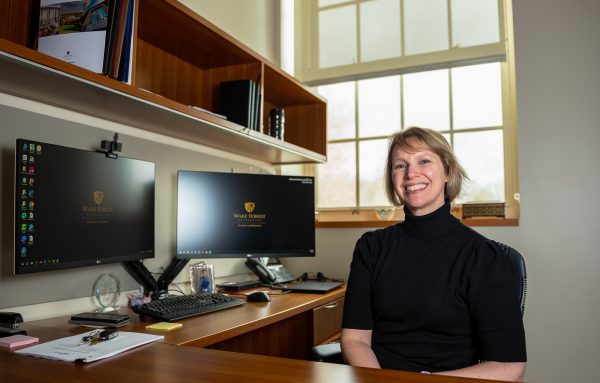Deacon Profile: Boxi Chen
The finance and statistics double major has released over 30 songs
Boxi Chen performs one of his 30 songs, which he has been writing since his senior year of high school.
September 29, 2022
As a double major in finance and statistics, a Chinese international student from Zhejiang Province, a singer, songwriter, and producer — Boxi Chen, Wake Forest senior, has multiple identities rolled into one.
However, unless you open his closet in Polo Residence Hall and turn on the light of this treasure box, many of these layers may remain hidden. On his standard-issue dorm desk sits Chen’s computer, and next to it, his sound card and his microphone.
“I make my closet into a smaller studio because the clothes in the closet can absorb some sound reverbs from the wall, so [the sound] can be more concrete,” Chen said.

A peek into the miniature studio reveals Chen’s extensive musical story.
With 30 original singles and one album with 12 singles so far, Chen has been involved with music since elementary school. He began by learning the Chinese flute and joined a folk music band that gave him professional music practice. In high school, Chen found his newfound interest in playing guitar and studied it by himself while using Logic Pro X, a digital program for music arrangement, and watching YouTube videos. It was in his senior year of high school that his first single debuted, and he signed to one of the three record companies that have promoted his music.
“I would like to describe my music as pop and hip pop, but I actually make a lot of styles,” Chen said. “I try a lot of styles. If I like those styles, I would just try them and try to add them to my vibes.”
Besides traditional Mandarin pop and hip pop, Chen engages with Electronic Dance Music (EDM), R&B, folk music and pure rap. “A Thousand Words,” one of the hit songs on his album that can be found on Spotify, is an EDM with future bass, according to Chen.
“I have a lot of times when I’m dreaming I have a very good melody. So when I wake up, I just open the recording and try to remember it,” Chen said.
Chen talked about how his song ideas usually come from his daily life, moments of self-depression and the time he spent alone.
“I think [Wake Forest] gives me a lot of ideas because the environment is not a big city,” Chen said. “There’s not a lot of chances if you are in a big city that you can spend more time with yourself or be alone. So sometimes, even if there is a period of time that we spend with ourselves, … [it] is very inspiring.”
However, Chen never pushes himself to come up with song ideas intentionally. He explained it with his experience of taking many jobs from his record company to write songs and sell them like song missions.
“You have to stand in front of a soundtrack for one hour and you have to come up with a melody; it’s totally like torture to me,” Chen said.
Instead of treating music as his profession, Chen takes it as a way to express himself; a person he can talk to and a purpose in his life.
“Playing music and making my own music just comes from my pure happiness,” Chen said. “So if I become a [professional] songwriter, maybe I will lose a large part of my life.”
Chen emphasized that he would keep music as his interest but not his career. What he really wants to pursue in the future is a finance-related job.
“I might be in investment banking, financial engineering and financial mathematics,” Chen said. “And finally, I want to be part of venture capital and private equity.”
Chen highlights how he loves finance no less than music, which was part of the reason why he devoted himself to founding The Wakers.
As an on-campus business project, The Wakers is aimed at providing an online forum for Chinese students to rate professors and discuss campus life. Its set up in 2020 was based on the time when Chen, then a sophomore, had trouble knowing how to register for classes, open a bank account in the United States, where to order Chinese food or where to find ratings of professors.
“I’m thinking about making this inconvenience disappear by setting up a website, an app, or something like that, to solve those inconveniences to help those newcomers from China,” Chen said.
The Wakers have grown to be influential among Chinese students, and they were registered to North Carolina’s limited partnership last year. However, when Chen recalled starting from scratch – building the website, brainstorming with the other three upper-class co-founders, having meetings every day, and looking for investors – it was still a floundering journey for him.
“You have to find how to make startups, what problems you want to solve, how to make your product cost-efficient, how to promote your product, and how to enlarge your economy of scales,” Chen said. “Especially when you are the main manager of the organization, you have to face a lot of difficulties, a lot of questions every day.”
While Chen tried to troubleshoot everything by paying both effort and consulting accounting, business and finance professors at Wake, he acknowledged that his team’s limitations originated from their lack of time and money and the fact that they would soon graduate.
“Right now we don’t have any more meetings because, in senior year, everyone has much more important things to do,” Chen said. “Because we need someone to take it to the next generation, I am still thinking about it. ”
Chen remained modest whenever talking about his music or business project. It seems the traction he gained on streaming platforms and the wide use of The Wakers makes him no different from the four-point line life he has on campus: dorm, classrooms, the Pit and gym.
“I think being popular is finding a group of people that can understand your song, your emotions, or your experiences,” Chen said. “And maybe even sometimes you can just help them overcome difficulties … and give them support through your work.”






















